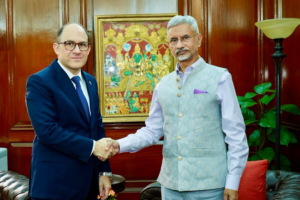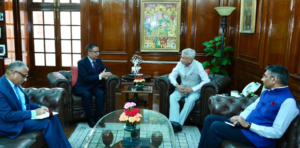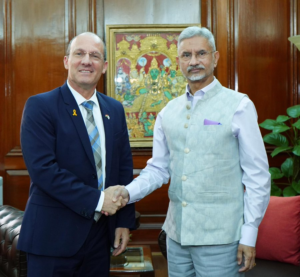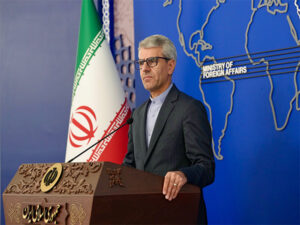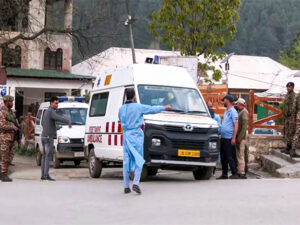After Kathmandu, Nepal’s Pokhara bans all Indian films amid Adipurush dialogue row
Kathmandu [Nepal], June 19 (ANI): Standing alongside Kathmandu Metropolis, the Pokhara Metropolitan City has also enforced a ban on the screening of Indian films following the ‘Adipurush’ dialogue controversy.
An announcement in this regard was made by Pokhara Mayor on Sunday, directing cinema halls in the Metropolitan city of central Nepal to stop screening of all Bollywood films starting from Monday morning. Earlier on Sunday evening, Nepali capital Kathmandu’s Mayor Balendra Shah had enforced a ban on Indian films. Soon after the announcement, the Pokhara Mayor, Dhanraj Acharya, sent letters to three movie theatres directing them to stop the screening of all Indian films.
After the orders from the mayors of both Metropolitan cities, the cinema halls in both here have scrapped the screening of Hindi or Bollywood films from their schedule and replaced them with Hollywood and Nepali movies.
Kathmandu Mayor on Sunday evening took to Facebook and announced a ban on the screening of all Indian films by deploying the Kathmandu Metropolitan Police.
“Indian film Adipurush had a dialogue claiming Janaki was India’s daughter which is objectionable and we had given three days’ ultimatum to correct it. There is no doubt that it is the first duty of every government, government agency, non-governmental sector and Nepali citizen to protect the national interest by keeping Nepal’s freedom, independence and self-respect intact,” the Kathmandu mayor stated in the Facebook post.
The mayor further claimed it is the duty of all the government authorities to protect the national interest and stated the screening of films will damage the national identity, nationality and cultural unity.
“If the film is shown as it is, it seems that Nepal’s nationality, cultural unity and national identity will be severely damaged and irreparable damage will be done. Due to cultural encroachment on Nepal from that movie, this metropolitan city has attracted serious attention,” the mayor stated.
Shah stated that the film is against the national interest and announced a ban on the screening of all Indian films in Kathmandu starting Monday morning. “If the film is allowed to be shown in other areas within the country and abroad, it will establish a misleading fact, so it is prohibited to show any Indian film in the Kathmandu metropolitan city until the objectionable parts are removed from the said film,” he said.
As per the mayor’s secretariat, the Kathmandu Metropolitan Police has been deployed on Sunday evening and relayed the message to ban the screening of Indian films from Monday morning. The Kathmandu Metropolitan has 17 film theatres, as per the record of the metropolis.
Soon after the announcement of the ban on screening in the Nepali capital, the ‘T-Series’ the production company of ‘Adipurush’ has written to Nepali Mayor stating it was “never intentional or deliberate to cause any disharmony for anyone,”
Defending the disputed dialogue, the company also claimed that it wanted to show respect towards women quoting the dialogue which was objected to by the Nepali mayor in particular.
“We request you to view the film in its artistic form and support the intention of reaching out to a larger audience to create interest in our history,” the letter signed by Radhika Das from the Super Cassette Industries Private Ltd also known as T-Series concludes.
The Hindi film Adipurush released all across the globe on Friday contains a dialogue that states ‘Janaki is a daughter of India’. The dialogue, however, has been removed in Nepal after the censor board of Nepal objected to it and delayed its release for Friday.
The film company had silenced the dialogue after which it received permission to screen in the theatres of Nepal. However, Friday’s morning show didn’t go as planned due to a delay in the circulation of the film and fear of vandalism.
Balendra Shah, Kathmandu Metropolitan City (KMC) Mayor earlier on Friday wrote a letter to the Ministry of Communications and Information Technology requesting to stop the screening of Indian films in Nepal unless an objectionable dialogue from a recently-released movie is omitted.
Shah also sent the same copy to the Office of Prime Minister and Council of Ministers, Ministry of Foreign Affairs and Film Development Board urging the government to take diplomatic initiatives with India to remove the dialogue.
Mentioning that Article 5 and Article 56 (6) of the Constitution have assigned the responsibility to federal, provincial and local governments for the protection of national interest, Shah has said the metropolis was concerned due to cultural encroachment by the movie.
Mayor Shah on Thursday also warned that no Hindi films will be allowed to run in Kathmandu Metropolitan City until the controversial wording is removed not just in Nepal but also in India.

